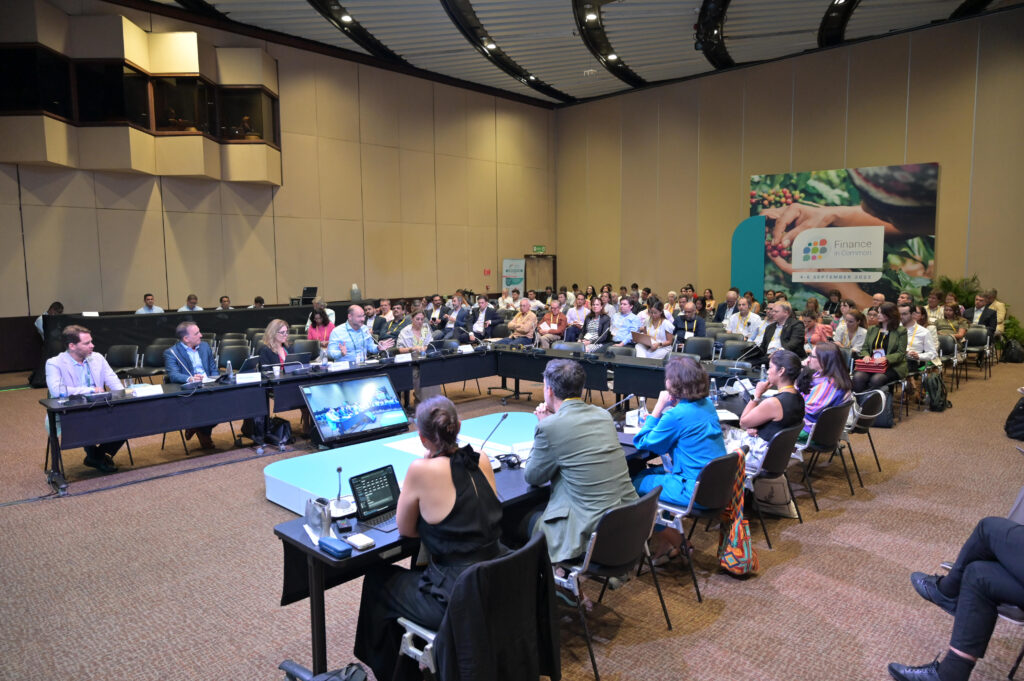IDB-UN Women report: Despite progress, challenges remain to offer financing programs for women and their businesses
September 6, 2023
CARTAGENA, Colombia – While public development banks (PDBs) today provide a variety of programs to improve credit access for women, investments that go beyond financial capital are needed to address the unique needs of women and their businesses and drive a more inclusive financial sector, according to a new global survey conducted by the Inter-American Development Bank (IDB) and UN Women.
The new report, “Financing Programs for Women’s Financial Inclusion and Access to Finance for Women MSMEs: Results from a Survey of Public Development Banks,” presented during the Finance in Common Summit (FiCS) from September 4-6 in Cartagena, Colombia, shows progress, opportunities and challenges in offering financing programs for women and their businesses.
The survey, completed by 54 PDBs, indicates the banks have come a long way in offering programs for women-owned Micro, Small, Medium Enterprises (MSMEs) that focus on productive financing, business development, green and climate financing, and financial education and literacy. A full 91% of surveyed PDBs also include products designed for women as part of their women MSME programs, predominantly offering working capital and investment loans with lower interest rates and non-financial support.
The data shows that PDBs, with the leadership of multilateral development banks, are addressing gender biases, and that multilateral development banks are also driving the design of data-driven, gender-responsive products, as well as new instruments like gender bonds. PDBs with a national mandate—national development banks –are predominantly offering preferential features in products for women MSMEs, including lower interest rates, flexible repayment terms, and unsecured loans, whereas other PDBs, including subnational development banks, resort to cashflow lending methods.
However, the survey also concludes that there is still progress that needs to be made to expand access to finance for women and their businesses, as well as improving women’s financial inclusion. The report here points to the lack of sex-disaggregated data and limited understanding of financial needs of women MSMEs as the main challenges.
Likewise, the survey highlights that the lack of collateral and limited credit history records present another barrier for broadening financing programs for women. At the same time, a low percentage of surveyed institutions declare accepting nontraditional collateral and using alternative credit scoring mechanisms, suggesting an opportunity for PDBs to explore further innovations that mitigate collateral-related barriers for women-owned MSMEs.
“PDBs play a key role in enhancing access to credit for MSMES and act as change catalysts for achieving a more inclusive financial sector. The report’s findings indicate that the sector is investing in programs to improve credit access for women, but there is still significant opportunity to expand these types of solutions both in terms of their reach and the types of programs offered for this important segment of our countries’ economies,” stated Gabriela Andrade, Lead Specialist of the Connectivity, Markets, and Finance Division at the IDB.
“The IDB is committed to continuing its support for PDBs in Latin America and the Caribbean in this important agenda, which includes financing and structuring programs, providing technical assistance, as well as fostering knowledge generation,” she added.
Adopting appropriate definitions of what constitutes a women MSME, strengthening institutional capacity and enhancing monitoring and evaluation practices, as well as knowledge-sharing among PDBs, are some of the recommendations presented in the report to deepen financial inclusion of women and their businesses.
“To truly make a difference, we call for investments that go beyond financial capital. Capacity building, mentorship, and access to networks are essential components that can propel women- owned businesses toward sustainable growth. This also means designing financial products and programs that address the unique needs of women and acknowledge their diverse roles,” said Dr. Jemimah Njuki, Chief, Economic Empowerment at UN Women.
“Moreover, the impact should be measured not solely in terms of economic outcomes, but also in terms of social and environmental benefits. We encourage public development banks to adopt a long-term perspective, by aligning their strategies with the broader objectives of gender equality and sustainable development,” she added.
Women-owned or -led businesses comprise 23% of MSMEs globally and face a staggering financing gap of $1.5 trillion, according to the SME Finance Forum. Similarly, according to the 2021 Global Findex, 27.7% of women over 15 years old borrowed money from a financial
institution, compared to 30.6% of men, with Latin America and the Caribbean showing a larger gender gap as these proportions reach 24% of women and 35% of men in the region.
More than two-thirds of surveyed PDBs view positive social impact and growing market potential as opportunities for expanding programs for women-owned MSMEs. PDBs also consider that financial education is fundamental to enhancing women’s financial inclusion.
The survey was developed as part of the work of the FiCS Coalition on Gender Equality and Women’s Empowerment in Development Banks, co-chaired by the IDB and UN Women in 2023.
About the IDB
The Inter-American Development Bank is devoted to improving lives. Established in 1959, the IDB is a leading source of long-term financing for economic, social and institutional development in Latin America and the Caribbean. The IDB also conducts cutting-edge research and provides policy advice, technical assistance and training to public- and private-sector clients throughout the region. Take our virtual tour.
About UN Women
UN Women is the United Nations entity dedicated to gender equality and the empowerment of women. A global champion for women and girls, UN Women was established to accelerate progress on meeting their needs worldwide. Through its Sustainable Finance Programme, UN Women supports the development of standards, financing instruments, partnerships and advocacy initiatives that aim to unlock more and better financing for gender equality and women’s empowerment. Visit: www.unwomen.org.
Press Contacts:
IDB: Vanessa Molina, [email protected]
UN Women: Kiri Ginnerup, [email protected]


